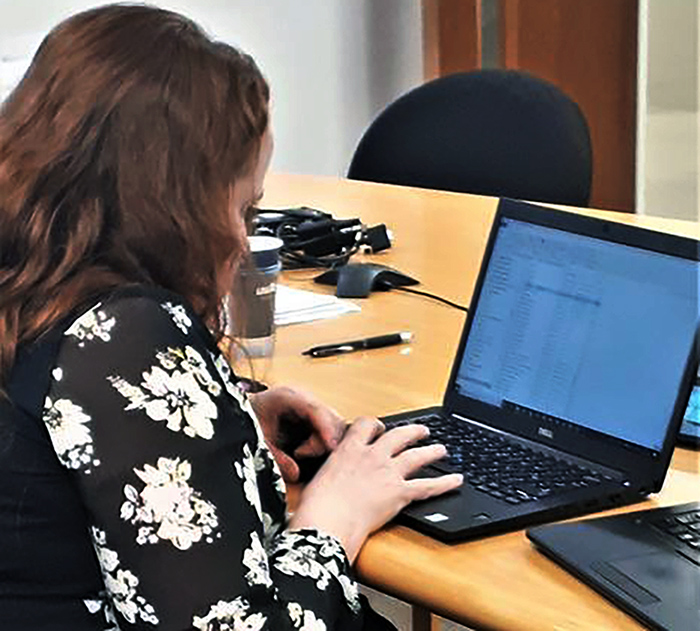By Dr. Tim Sandle
December 13, 2024
DIGITAL JOURNAL

Laptops are useful, but bring with them privacy and security concerns. — Photo: © Tim Sandle.
What will 2025 have in store for the employee experience and the application of artificial intelligence within the world of work?
Answering this, the company Rightpoint, which has partnerships with Adobe and Microsoft, focuses on human-centric digital transformation. Digital Journal heard from Tom Keuten and Jesse Murray, who have extensive experience with the technology shaping customer and employee experiences.
Keuten and Murray note that as the AI landscape continues to evolve in 2025, we should expect an evolving AI landscape where technology enhances experiences and productivity while driving human-centric engagements.
Starting with Jesse Murray, SVP of Employee Experience at Rightpoint. According to Murray, AI needs to be put into service to support workers within the firm. Murray makes three essential points for businesses to take note of.
Companies will need to customize AI tools to enhance employee experiences
Murray says: “Recent AI-driven expansion of collaboration tool options and capabilities is creating user confusion, lost productivity, and lower engagement. To address this trend of limitless options, companies will have to understand employees and personalize technologies accordingly, rather than employ something generic that will not stick. This includes integrating platforms with existing tools and systems.”
AI-Enhanced Workflows will Redefine Employee Productivity
Murray observes: “The next big shift in employee experience will come from AI’s ability to enhance workflows, allowing employees to focus on higher-value tasks and take on new capabilities. While we’re already seeing AI supporting tasks like note taking or generating summaries, the long-term potential lies in AI helping employees achieve tasks that were previously out of reach: designers generating code or executives extracting insights with Python, all with AI as the enabler. Over time, AI will evolve into role-specific applications that learn about employees’ individual contexts, transforming productivity across all sectors.”
AI and Data Driven Insights will Drive Hyper-Personalized Employee Experiences
On the subject of big data, Murray indicates: “As companies gain unprecedented insights into how employees work, the future of employee experience (EX) lies in hyper-personalization.”
As to how companies can harness this, Murray proposes: “Tools like Microsoft Viva Insights are already analyzing digital interactions—email, meetings, and chats—to reveal key patterns in collaboration, leadership, and productivity. By combining these insights with employee engagement data from platforms like Qualtrics, employers can create tailored roles and workflows that match employees’ preferences, whether it’s flexible hours, remote work, or group collaboration.”
In terms of the consequences, Murray opines: “This shift will unlock new levels of employee engagement and efficiency, driving business success through truly personalized work experiences.”
How can AI automate decisions and improve the employee perspective?
ByDr. Tim Sandle
December 13, 2024
DIGITAL JOURNAL

A man uses a laptop at a coffee shop in downtown Hanoi. - AFP
In a companion article, we asked the question: ‘What will 2025 have in store for the employee experience and the application of artificial intelligence within the world of work?’
Continuing this theme, and drawing on the expertise of Rightpoint, Tom Keuten SVP & Global Microsoft Alliance Lead at Rightpoint, considers how digital transformation will evolve in 2025 and why it is time for human resources to get behind the potential that AI promises.
HR technology will focus on driving human engagement
Keuten opens by considering how artificial intelligence can aid the employee, noting: “As technological opportunities increase, human connection through mentors and leaders will be critical for technical success. Positive employee experience will focus on aligning technology, human resources and organizational goals. Great HR technology has the opportunity to make an employee feel like the whole work experience has been created for them to contribute, learn and grow.”
Data Governance will Become the Backbone of AI-Powered EX
Building on the above, Keuten weighs in on exploiting the potential of AI to aid data governance processes: “As AI takes centre stage in improving employee experience, the spotlight will increasingly fall on the integrity of data. Trust will be the key differentiator in successful AI implementations, and technologies related to data governance, quality, and explainability will be critical.”
This means improved outcomes and better determinations, as Keuten finds: “With AI automating decisions and providing insights, employees and companies must trust the outputs. Building this trust will require robust data foundations that ensure accuracy, privacy, and transparency, making data governance essential for the future of AI-driven employee experience.”
Hybrid Work will Evolve with AI, Rethinking Digital and In-Person Engagements
Keuten considers how the current digital technology enhances the way workers interact with the office, and the best technological streams for achieving this shift. Here he observes: “As return-to-office (RTO) policies take shape and hybrid work models become the norm, AI will redefine how employees engage both digitally and in-person.”
As to specific platforms, Keuten throws his weight behind Microsoft, saying: “Tools like Microsoft Copilot are revolutionizing team collaboration by shifting from individual AI assistants to AI that supports group tasks. At the same time, in-person experiences will need to offer more meaningful engagement—gathering employees with a purpose rather than out of routine.”
Firms need to tread carefully, though, if the potential of digital transformation is to be realized. Keuten concludes with: “Companies must balance advanced AI tools that support digital collaboration with intentional, purposeful in-person experiences that foster deeper personal and professional connections.”

No comments:
Post a Comment